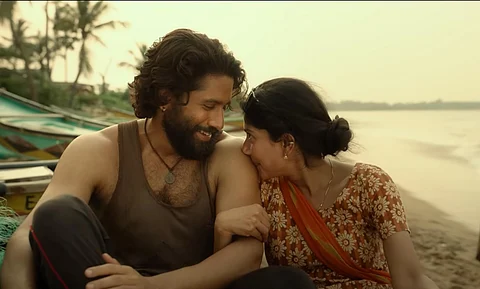

Thandel (Telugu)
After mesmerising audiences with their chemistry in Love Story, Naga Chaitanya and Sai Pallavi reunite in Thandel, directed by Chandu Mondeti. But this time, instead of a tender romance, we get a loud, over-the-top drama where nationalism is force-fed, and logic is left gasping for breath. Under the weight of its exaggerated theatrics, even the charming Chaitanya-Pallavi duo fail to keep their spark alive.
Thandel is based on a real incident—a few fishermen from Vizag accidentally crossing into Pakistani waters and getting imprisoned. It is undoubtedly a compelling premise, but what does Mondeti do with it? He injects a romance subplot so fragile that it disappears faster than a fishing boat in a storm.
Raju (Naga Chaitanya) often goes to Gujarat to work as a contract fisherman along with his crew from Andhra Pradesh’s coastal village in Srikakulam. He rarely visits the village otherwise and the small window when he does return is the only time during which Sathya (Sai Pallavi) finds solace. She resumes eating meat and enjoys other privileges only when Raju is around her. Meanwhile, Raju’s heroics and his leadership earn him the title of ‘Thandel’ - leader of the fishing crew.
But an awry incident–a work hazard faced by the fishing community– triggers fear in Sathya. She asks Raju to give up fishing and stay back with her in the village. Conflict flares up between the couple when Raju does not heed her suggestion. Seething with anger, Sathya decides to marry someone else, and in the meantime, Raju is captured in Pakistan.
Thandel suffers greatly from poor writing. Though the story is primarily about the couple – Raju and Sathya – and their yearning for each other, there is not a single effective scene which anchors their love story. I was left with no reason to root for them except that I was forced to sit through the film.
The first half of the film severely tests your patience, with the story progressing at a snail’s pace and scenes so lethargically written that they offer the audience nothing to hold on to. The frustration is further amplified by Devi Sri Prasad’s theme music, which chips away at whatever patience you have left, each time it plays. The repetitive use of the same tune becomes increasingly unbearable, but the drama picks up in the pre-interval block, offering a brief glimpse of hope that the film might finally escape its sluggish loop.
Unfortunately, the second half of the film turns into a Roja-style hyper-nationalistic spectacle.
Raju and his crew, captured by Pakistan’s Navy for trespassing into their borders, are imprisoned in Karachi’s jail. The ordeal they face could have offered some poignant moments, but Chandu Mondeti exploits the plot to amplify extreme nationalism, reminiscent of Mani Ratnam’s Roja, which was released almost 33 years ago; just for context. Chandu overindulges in force-fitting patriotism when it is absolutely not necessary, and logic naturally becomes a casualty in the process.
Thandel doesn’t just tell a story; it force-feeds patriotism at every turn. Pakistan is portrayed to be so irredeemably evil that they don’t even have juvenile homes– Mondeti shows a 15-year-old boy getting thrown into Karachi’s most notorious prison alongside adult fishermen.
Then comes the “patriotic” moment—a grand, illogical sequence involving the Indian flag. Pakistani prison authorities strip-search the Indian men and confiscate everything. Yet, somehow, an Indian flag magically makes its way inside! Maybe it had divine approval? The screenplay doesn’t bother explaining, probably assuming the audience won’t question anything wrapped in the tricolour.
There are many other such exaggerated scenes in the film which defy logic. Even when the fishermen accidentally enter Pakistani waters during a storm, it is shown that they were trying to save Pakistani fishermen. They just drifted while escaping a storm, a plausible mishap during the job, but the film simply had to use the instance to exaggerate emotions.
Chandu Modeti’s drama is a one-part romance drama and one-part India vs Pakistan jingoism, but it fails at both. It is disappointing that though Raju’s crew has some 22 members, these secondary characters are not given any arcs. Further, the film’s extreme focus on Sushma Swaraj’s role as the Minister of External Affairs makes it feel more like a blatant propaganda piece.
Thandel neither works as a love story nor as a story of survival. Despite the earnest performances of Naga Chaitanya and Sai Pallavi, Thandel gets overshadowed by its loudness and superficiality. The romance is half-baked, the drama is bloated, and the nationalism is dialled up so high that it drowns out any emotional depth.
If you enjoy films that scream patriotism at you while sacrificing logic, Thandel may entertain you. But if you expect a poignant love story or a gripping survival drama, you’ll be disappointed by the wasted opportunity.
Disclaimer: This review was not paid for or commissioned by anyone associated with the film. Neither TNM nor any of its reviewers have any sort of business relationship with the film’s producers or any other members of its cast and crew.